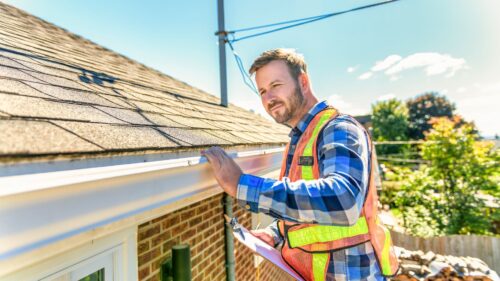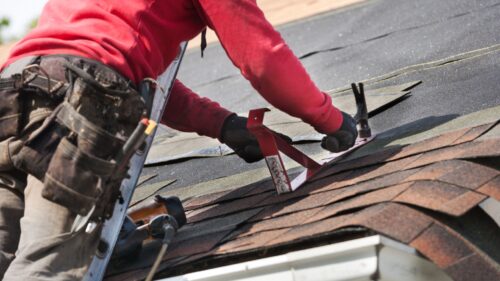Considering a roof overhaul in Kansas City? You’re likely pondering over the “Roof Replacement Cost in Kansas City, KS.” It’s no small decision. With costs ranging broadly based on materials and labor, understanding what influences these expenses is crucial. So, whether you’re leaning towards sticking with asphalt shingles or maybe considering switching things up with a metal roof, this guide’s here to help clear up the confusion and make those numbers a bit less overwhelming.
Understanding Roof Replacement Costs in Kansas City, KS
The average cost to replace a roof in Kansas City is between $10,000 and $23,000 and typically ranges between $3.40 and $10.00 per square foot depending on a variety of factors. When you’re ready for a more accurate quote, call Royal Roofing & Solar, but, in the meantime, we’ll go over some of the different things that can impact your replacement roof cost.
You’ll need to get in touch with a contractor for an accurate estimate following an inspection. Today, the average roof replacement cost is $8,600, with most people in Kansas City spending between $5,000 to $11,000. While your roof replacement estimate could be as low as $5,000, it could also be as high as $45,000. Really, everything hinges on the factors we just talked about.
Factors Influencing Roof Replacement Costs
The material of both your old roof and your new roof will have a big impact on the replacement cost of your roof. The old roof will need to be removed and disposed of which will have variable costs depending on the material. The cost of the material and installation of your new roof will also play a big role.
Whether or not your roof has damages at its substrate or underlying roof boards is the frequency at which this structure is having problems. Although it is perfectly normal to lose one or two shingles during a heavy storm, you shouldn’t have to pay for multiple roof repair in Kansas city over the course of a single storm season. These systems are built tough, ready to take on anything Mother Nature throws their way and handle a ton of wear without breaking a sweat. As such, they’re most prone to developing recurring problems when they’re aging and starting to break down.
The Role of Material and Labor in Pricing
Much like repair costs, roof replacement costs are also determined by the needed labor and materials. In Kansas City, roofs replacements can range between $5,000 and $10,000. When homeowners want special designs and features, the price of these projects can become much higher. Choosing an all-copper roof will invariably cost more than installing a simple asphalt shingle roof. When Kansas City homeowners choose roofing materials and designs, they should consider local weather conditions, the average lifespans of different options, and the overall surface area that needs to be covered, among other things. With repair costs averaging $900 and roof replacements starting at approximately $5,000, homeowners who are dealing with recurring repair issues will often find replacement to be a far more cost-effective choice.
Choosing the Right Roofing Material for Your Home
Asphalt shingle roofs are the most common and affordable residential roofing material available in Kansas City. If you choose to replace your roof with asphalt shingles you can expect to pay between $10,000 to $15,000 on average.
Metal roofs are greatly increasing in popularity due to their superior durability and cost-effectiveness. The average cost of a metal roof replacement in Kansas City is around $17,000 to $23,000.
Pros and Cons of Popular Roofing Materials
Asphalt shingles are the most popular choice for residential roofing in Kansas City. They won’t break the bank, they’re a breeze to set up, and you can pick from an array of colors and styles that suit your taste. That said, these materials don’t last as long and might need you to roll up your sleeves for repairs a bit more often.
Metal roofing is becoming increasingly popular due to its durability, energy efficiency, and low maintenance requirements. This powerhouse can stick around for over half a century, and it laughs in the face of fire, wind, or hail damage. The downside is that it’s more expensive than asphalt shingles and can be noisy during heavy rain or hail.
Tile roofing is a classic choice that adds a distinctive look to your home. It’s durable, fire-resistant, and can last up to 100 years with proper maintenance. However, it’s heavy, expensive, and requires a sturdy roof structure to support its weight.
Slate roofing is another high-end option that offers a unique, natural look and can last over a century. It’s fireproof, waterproof, and resistant to mold and fungus growth. The drawbacks are its high cost, heavy weight, and the need for specialized installation.
Flat roof installation is common for commercial buildings and some modern residential designs. Not only is it budget-friendly and a breeze to keep up with, but this gem also doubles as cozy living space or your own personal garden oasis. However, it’s prone to leaks and requires regular maintenance to prevent water damage.
Impact on Home Value and ROI
Choosing the right roofing material can have a significant impact on your home’s value and resale potential. Investing in a top-notch, long-lasting roof can really catch the eye of potential buyers and plays a big role in getting back what you spent on it when it’s time to put that ‘For Sale’ sign up.
According to Remodeling Magazine’s 2021 Cost vs. Value Report, a midrange roof replacement using asphalt shingles can recoup up to 60.7% of its cost at resale, while a metal roof replacement can recoup up to 61.2%. This means that not only will a new roof protect your home and improve its curb appeal, but it can also provide a solid return on investment.
Navigating the Roof Installation Process in Kansas City
Once you’ve chosen your roofing material, it’s time to start planning for the installation process. The first step is to find a reputable roofing contractor who has experience with your chosen material and can provide references and examples of their work.
When comparing bids from different contractors, make sure to ask about their installation process, timeline, and any warranties or guarantees they offer. A good contractor will be transparent about their pricing and will provide a detailed estimate that includes all labor and material costs.
Selecting a Qualified Roofing Contractor
Choosing the right roofing contractor is just as important as selecting the right roofing material. A qualified contractor will have the experience, skills, and equipment necessary to install your new roof correctly and efficiently.
Start by asking for recommendations from friends, family, or neighbors who have recently had their roofs replaced. You can also check online reviews and ratings from sites like Google, Yelp, or the Better Business Bureau to see what other homeowners have to say about their experiences with different contractors.
When interviewing potential contractors, ask about their licensing, insurance, and certifications. A reputable contractor will be willing to provide proof of their credentials and will have no problem answering your questions or providing references.
Preparing for Installation Day
Once you’ve chosen your contractor and scheduled your installation date, there are a few things you can do to prepare for the big day. Start by clearing your driveway and any areas around your home where the contractors will need to work. Move any vehicles, outdoor furniture, or decorations that could be damaged during the installation process.
If you have any fragile items inside your home, such as pictures or mirrors, consider taking them down or moving them to a safe location. The vibrations from the roofing work can sometimes cause these items to fall and break.
Make arrangements for your pets and children to be out of the house during the installation process. The noise and activity can be stressful for them, and it’s important to keep them safe and out of the way of the contractors.
Finally, make sure to communicate with your contractor about any special instructions or concerns you have before the installation begins. They should be willing to work with you to ensure that the process goes as smoothly as possible and that you’re satisfied with the final result.
Maximizing Your Investment with Quality Roofing Brands
When it comes to choosing the best roofing materials brands, there are a few key factors to consider. First and foremost, you want to look for brands that have a proven track record of durability and longevity. After all, your roof is a major investment, and you want to make sure it will last for decades to come.
Some of the top-rated roofing brands known for their quality and reliability include GAF, CertainTeed, Owens Corning, and Atlas. These brands offer a wide range of materials, from traditional asphalt shingles to more premium options like metal, tile, and slate.
Another important factor to consider is the warranty offered by the manufacturer. Look for brands that offer robust warranties on both materials and labor, as this can provide added peace of mind and protection for your investment.
Top-Rated Brands for Durability and Aesthetics
GAF is one of the most well-known and respected roofing brands in the industry. They offer a wide range of asphalt shingle options, from basic three-tab shingles to more premium architectural and designer styles. GAF also offers a comprehensive warranty program, including a 50-year material defect warranty and a 25-year workmanship warranty on their top-tier products.
CertainTeed is another top brand known for their high-quality roofing materials. They offer a variety of asphalt shingle options, as well as more premium materials like metal, tile, and slate. CertainTeed also has a strong focus on sustainability, with many of their products featuring recycled content and energy-efficient properties.
Owens Corning is a well-respected brand that offers a range of roofing materials, from traditional asphalt shingles to more innovative options like their Duration FLEX shingles, which are designed to withstand extreme weather conditions. Owens Corning also offers a robust warranty program, including a 50-year material warranty and a 10-year workmanship warranty on their top-tier products.
Atlas is a lesser-known brand that has been gaining popularity in recent years due to their high-quality products and competitive pricing. They offer a range of asphalt shingle options, including their Pinnacle Pristine line which features a unique color-matching technology for a more seamless and cohesive look.
When choosing a roofing brand, it’s important to work with a reputable contractor who has experience installing that particular brand’s products. They can help guide you through the selection process and ensure that your new roof is installed correctly for optimal performance and longevity.
Planning for the Unexpected: Weather Conditions and Lead Times
When planning a roofing project in Kansas City, it’s important to keep in mind the potential impact of weather conditions and lead times. The storm season in the Midwest can bring heavy rain, high winds, and even hail, which can delay or disrupt the installation process.
In addition, the high demand for roofing services during peak seasons can lead to longer lead times and potential delays in getting your project started. It’s important to plan ahead and book your roofing contractor well in advance to ensure that your project can be completed in a timely manner.
How Seasonal Changes Affect Your Roofing Project
The best time to schedule your roofing project in Kansas City is typically in the spring or fall, when the weather conditions are mild and there is less chance of severe storms. However, even during these seasons, it’s important to keep an eye on the forecast and be prepared for potential delays.
If your roofing project is scheduled during the summer months, it’s important to keep in mind that high temperatures can affect the installation process. Asphalt shingles, for example, can become soft and pliable in extreme heat, making them more difficult to work with and potentially leading to issues with adhesion.
Tackling a roofing project in the winter comes with its own set of hurdles, especially when snow and ice turn your roof into a no-go zone for contractors. In addition, cold temperatures can affect the performance of certain roofing materials, such as adhesives and sealants.
To minimize the impact of weather conditions on your roofing project, it’s important to work with a contractor who has experience working in your local climate and can adapt their installation process as needed. They should also have contingency plans in place for dealing with unexpected weather events or delays.
When scheduling your roofing project, be sure to ask your contractor about their lead times and how far in advance you should book to ensure that your project can be completed on time. Keep in mind that lead times can vary depending on the time of year and the complexity of your project, so it’s always best to plan ahead as much as possible.
The Long-Term Benefits of a New Roof on Home Value
Investing in a new roof not only provides immediate benefits in terms of protection and energy efficiency, but it can also have a significant impact on your home’s value over the long term. A high-quality, well-maintained roof is a major selling point for potential buyers and can help you command a higher price when it comes time to sell.
According to Remodeling Magazine’s 2021 Cost vs. Value Report, a midrange roof replacement using asphalt shingles can recoup up to 60.7% of its cost at resale, while a metal roof replacement can recoup up to 61.2%. This means that not only will a new roof provide immediate benefits in terms of protection and energy efficiency, but it can also provide a solid return on investment over the long term.
Calculating ROI on Your Roof Replacement Project
To calculate the potential return on investment (ROI) for your roof replacement project, start by determining the total cost of the project, including materials, labor, and any additional fees or permits. Then, research the average home values in your area and the typical resale value of homes with new roofs.
For example, let’s say you spend $15,000 on a new asphalt shingle roof for your home, which is currently valued at $250,000. If homes in your area with new roofs typically sell for $275,000, you could potentially see a return of $25,000 on your investment, or an ROI of 166%.
Of course, the actual ROI of your roof replacement project will depend on a variety of factors, including the age and condition of your home, the local real estate market, and the specific materials and design of your new roof. However, in general, a new roof is considered one of the most valuable home improvements you can make in terms of both immediate benefits and long-term value.
Roof Replacement Cost in Kansas City, KS FAQs:
How much does it cost to replace 1000 sq ft of roof?
In Kansas City, replacing a 1000 sq ft roof typically runs between $5,000 and $10,000. The choice of material significantly influences the price.
How long does a roof last in Kansas City?
In Kansas City, roofs usually last for 20 to 30 years. However, this is contingent on favorable weather conditions and regular maintenance.
Conclusion
So there you have it – navigating through the world of roofing replacements doesn’t have to feel like deciphering an ancient code. The key takeaway here is simple; knowing what impacts Roof Replacement Cost in Kansas City, KS, helps make choices clearer and less daunting. From material types to labor considerations – every element plays its part in shaping costs. Ready to compare quotes? Fill out this form to get started.




